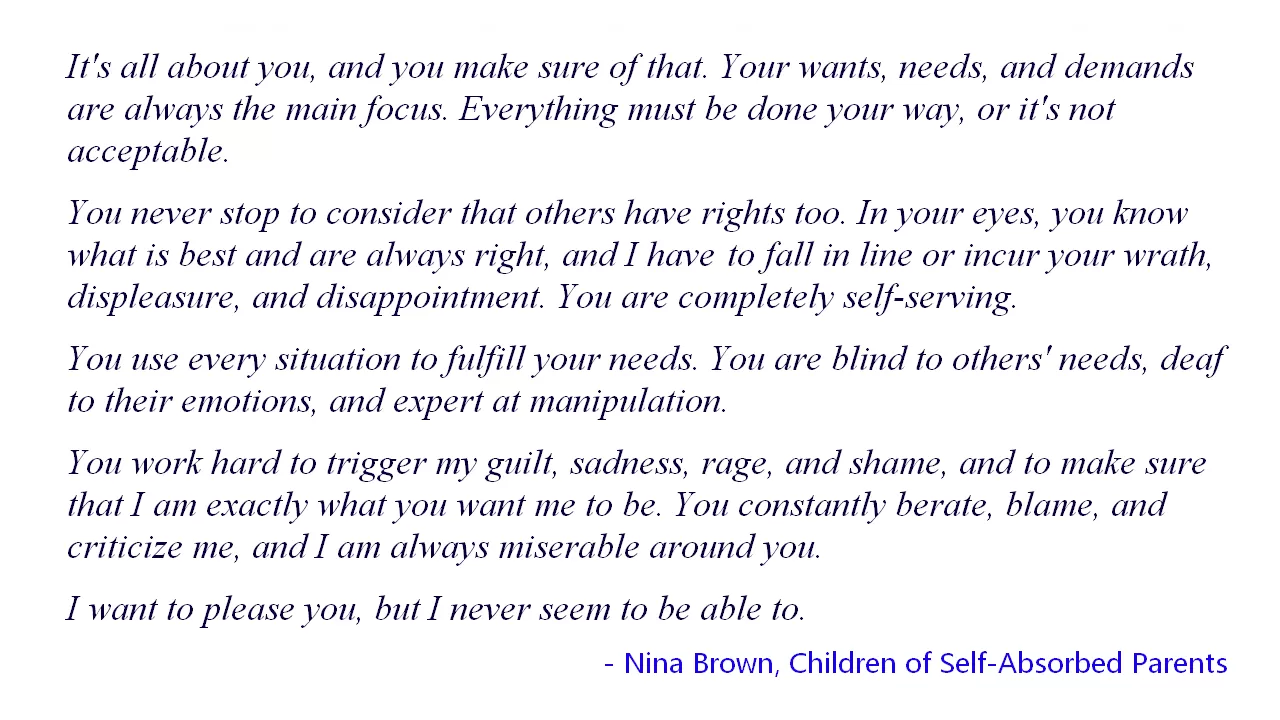• Dec 14, 2024 • Read in ~10 mins
— Reviewed by Dr. Sandip Roy.You can’t easily tell if a covert narcissist mother is mean to her kids; she’s too subtle to be noticed by outsiders.
She operates from behind a mask of empathy, kindness, and “I’m always so worried what will happen to you without me!”
It is hard to imagine that she could emotionally hurt her children. Even her children think that her stinging words and abusive acts are meant for their welfare.
In contrast, the grandiose type of narcissist openly seeks praise and basks in self-glorification, and will treat their kids as unpaid servants.
Let’s find out how narcissistic mothers hurt their children by breaking down the ten most common things they say.
10 Toxic Things A Covert Narcissist Mother Can Say
This mother believes that she is entitled to manipulate her children into providing her with a narcissistic supply.

These are some acidic things these mothers say to their children:
1. “We’re so close, we’re practically the same person. You don’t need friends when you have a mom like me.”
Enmeshment and Emotional Manipulation:
Covert narcissistic mothers excel at creating an emotionally entangled relationship with their children. They skillfully blur the boundaries that separate their identity from their child’s.
This leads to a confusing mix of emotions and responsibilities that make it difficult for the child to develop a self-reliant personality.
They often gift-wrap this toxic enmeshment as genuine love and emotional closeness, making their abuse even harder to recognize.
This isn’t a healthy form of love; it’s a manipulative tactic designed to control and keep the child emotionally dependent on them.
2. “Is it so hard to make your mother happy? After all that I did for you, sacrificed my youth and happiness, you can’t even do this small thing for me?”
Subtle Toxicity:
Covert narcissistic mothers know the art of delivering toxic things with subtlety.
They use emotional manipulation, guilt-tripping, and passive-aggressive tactics to maintain control, rather than overt abuse.
The child often feels like they’re walking on eggshells, perpetually anxious about displeasing their mother or triggering an emotional outburst.
This sub-radar tension creates a toxic home environment where the child is always on high alert.
They constantly try to decode their mother’s mood swings and subtle digs, often draining themselves out physically and emotionally.
This covert strategy keeps the child in a state of emotional nothingness. Never sure where they stand, they are always slaving to win their mother’s elusive approval.
3. “See how much I do for you! I cook your favorite meals and buy you nice clothes. You should be grateful; not every mom does this!”
Exaggerated Acts of Care:
Covert narcissistic mothers are pundits at turning everyday parental duties into acts of heroism.
They don’t just cook meals or buy clothes; they make it seem like they’re making monumental sacrifices just by fulfilling the basic parental responsibilities.
This exaggerated display is often a calculated move to instill a sense of indebtedness in the child.
It’s not about the act of care itself, but about seeking constant praise and validation for their so-called “sacrifices.”
And extracting servile slavery later on when the child grows up.
The child grows up feeling perpetually obligated to their mother, as if they owe her something extraordinary for what are, in reality, ordinary acts of parenting.
This tactic keeps the child in an emotional chokehold, always striving to repay an unpayable debt.
4. “I always end up suffering and losing. Despite my putting you first all the time. While you just take all my sacrifices for granted.”
Victim Mentality:
Covert narcissistic mothers play the victim card quite well. They don’t just casually mention their sacrifices, they amplify them into epic tales of martyrdom.
They skillfully twist the narrative to make themselves appear as the ultimate victims in their relationship with their child.
This grandiloquent mention of their efforts is designed to keep the child in a perpetual state of guilt, indebtedness, and emotional bondage.
The child ends up feeling like a cruel villain in their own life story, always owing something to their mother who “suffers so much” for them.
Creating a full-blown victim perception in the child’s mind serves a dual purpose:
- It keeps the child trauma-bonded to the mother, and
- Provides the mother with a convenient excuse to dodge accountability for any toxic behavior if held to blame.
The child is left navigating a minefield of guilt, always anxious about adding to their mother’s list of “sufferings.”
This manipulative cycle is hard to break. It may take the child a long time to realize that they were the actual victims in their relationship with their mother.
5. “Come here, I love you. But remember, if you ever leave me, you’ll lose all my love and regret it.”
Mixed Messages:
This is how covert narcissist moms trap their kids in a whirlpool of mixed messages. One moment, she showers them with love; the next, she makes that love conditional.
- The “Come here, I love you” is a warm invitation that suggests love and affection. It makes the child feel wanted and valued.
- It’s immediately followed by “But remember, if you ever leave me, you’ll regret it,” a threat. This part instills a fear of being abandoned. It also implies that her love will last as long as the child is obedient and loyal.
This toggling between love and control instills a deep-rooted self-doubt in the child. It is a well-crafted strategy to keep the child off-balance.
The child suffers perpetual uncertainty, never knowing which version of their mother they’ll encounter next.
So the child remains emotionally tethered, always seeking clarity but never quite finding it.
6. “Where do you think you’re going without me? You’re not ready to handle the world on your own.”
Resistance to Independence:
A covert narcissist mother can’t stand when her child starts to show signs of independence.
She reacts with criticism, reverse psychology, or even hostility to squash the child’s attempts to establish her own identity.
It keeps the child tethered to them, undermining the child’s confidence and autonomy.
This makes the child overly dependent on her mother even after she has grown up, which makes it easier for the mother to maintain control.

7. “Tell your friends how lucky you are to have a mom like me.”
Demands of Attention And Praise:
Some covert narcissistic mothers appear to be model parents to the outside world.
They loudly proclaim their sacrifices and what they do for their children, fishing for compliments and validation.
But this isn’t genuine pride in their kids; it’s a calculated move to gain attention and praise.
It makes the child feel obligated to feed her mother’s need for admiration. The child feels like she has to keep her mother happy, no matter what.
This helps inflate the mother’s ego while subtly devaluing the child’s own worth.
8. “You’re making a big deal out of nothing. You’re punishing me for something you just made up in your head. And it’s making me angry!”
Gaslighting And Raging:
Covert narcissistic mothers are good at subtle gaslighting and low-level raging to manipulate their children.
They dismiss their kids’ feelings as unfounded, shame them, and falsely blame them, all while insisting they are the ones being wronged.
This narcissistic gaslighting makes the child question their own perception, memory, and judgment. This fog of doubt freezes the child, making them look for direction from the mother.
And she gets to exert more control on the helpless and disoriented child.
The child often becomes hyper-vigilant, always on the lookout for the next emotional ambush. This constant alertness can lead to chronic stress and anxiety, further eroding their sense of self and well-being.
The mother takes to narcissistic raging when her gaslighting tactics fail.
9. “If you really loved me, you wouldn’t do this to me. How could you be so selfish?”
Emotional Blackmail:
A covert narcissistic mother can emotionally blackmail her child, using guilt, moral obligation, fear, and embarrassment to manipulate their children.
They often use their own needs and desires as tests of loyalty, setting up situations where the child feels trapped and damned if they do and doomed if they don’t.
This keeps the child in a perpetual state of emotional turmoil, She/he is left always second-guessing their choices and feeling “sinful” for stating their own needs or desires.
10. “I’ll only be proud of you if you become a doctor, not a musician.”
Conditional Love:
The love from a covert narcissistic mother often comes with strings attached.
This mother’s love is conditional, based on performance, achievements, or fulfilling her specific expectations.
The child learns to chase the affection and approval that’s always just out of reach.
They grow up believing that they are only as good as what they can do for their mother. And carry this mentality to their other adult relationships.
Sadly, they never fully understand the concept of unconditional love.
FAQs
What is “walking on eggshells?”
“Walking on eggshells” around a person indicates you are constantly fearful that you might say or do something that can trigger them to fly into a rage. You are afraid to be your true self or express your true feelings, as they might judge you harshly or reject you.
This insecurity about their tolerance of you makes you remain vigilant around them, never letting your guard down. So, you have to “walk on eggshells” around them.
How to recognize a covert narcissistic mother?
Recognizing a covert narcissistic mother can be challenging because they’re skilled at hiding their toxic behavior behind a facade of care and concern. Look for signs like emotional manipulation, exaggerated acts of care, and a victim mentality.
They often use subtle tactics like guilt-tripping, passive-aggressive behavior, and emotional blackmail to maintain control. If you find yourself constantly walking on eggshells or feeling indebted to your mother for basic acts of parenting, these could be red flags.
What are some common phrases covert narcissistic mothers use?
Covert narcissistic mothers often use phrases that seem caring on the surface but are actually manipulative.
Phrases like “We’re so close, we’re practically the same person,” or “Is it so hard to make your mother happy?” are designed to create emotional dependency and guilt.
They may also use gaslighting phrases such as “You’re overreacting” or “That never happened” to create confusion and self-doubt in their children.
Final Words
Covert narcissistic mothers live in a world where they’re the star, and everyone else, including their children, is just a supporting role.
They’re not just critical of their kids; they use blame and insults to keep them in line.
Worse, they create emotional codependency using a toxic mix of conditional love, emotional blackmail, trauma bonding, and guilt-tripping. This leaves the child in a state of constant cognitive dissonance.
If you’re an adult finding it hard to deal with the emotional scars from a narcissist mom, get help from a therapist to cope with your feelings of insecurity, shame, and self-loathing.
√ Also Read:
- Covert Narcissist Test: Is It A Narcissist or A Touchy Introvert?
- How To Know And Recover From A Covert Narcissist Mother?
- 10 Worst Problems of Living With A Narcissist
√ Please spread the word if you found this helpful.
• Our Story!